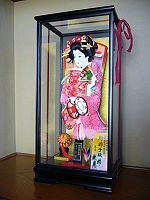
Hagoita
Encyclopedia

Paddle
A paddle is a tool used for pushing against liquids, either as a form of propulsion in a boat or as an implement for mixing.-Materials and designs:...
s, originating in Japan
Japan
Japan is an island nation in East Asia. Located in the Pacific Ocean, it lies to the east of the Sea of Japan, China, North Korea, South Korea and Russia, stretching from the Sea of Okhotsk in the north to the East China Sea and Taiwan in the south...
, ostensibly used to play hanetsuki
Hanetsuki
Hanetsuki is a Japanese traditional game, similar to badminton without a net, played with a rectangular wooden paddle called a hagoita and a brightly-coloured shuttlecock. Often played by girls at the New Year, the game can be played in two fashions: by one person attempting to keep the...
, but often instead serving a more ornamental purpose. These are frequently painted, usually with lacquer
Lacquer
In a general sense, lacquer is a somewhat imprecise term for a clear or coloured varnish that dries by solvent evaporation and often a curing process as well that produces a hard, durable finish, in any sheen level from ultra matte to high gloss and that can be further polished as required...
, with auspicious symbols, or decorated with complex silk collage
Collage
A collage is a work of formal art, primarily in the visual arts, made from an assemblage of different forms, thus creating a new whole....
s. This tradition dates to the 17th century, and although the game itself is now rarely played, crafting decorative hagoita is still commonplace. They are generally sold at traditional fairs, hagoita ichi, which are held in December. In Tokyo
Tokyo
, ; officially , is one of the 47 prefectures of Japan. Tokyo is the capital of Japan, the center of the Greater Tokyo Area, and the largest metropolitan area of Japan. It is the seat of the Japanese government and the Imperial Palace, and the home of the Japanese Imperial Family...
, they are sold at shrines, especially Asakusa and Furukawa Fudō.

